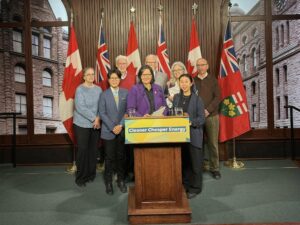SUDBURY ON: The climate crisis is extremely serious. In the natural world, climate change is leading to the demise of kelp forests, threatening ancient baobab trees with extinction and is attributed to wiping out puffin colonies. On the human scale, climate change is exacerbating the global refugee crisis and is impacting the mental health of Canadians. These facts barely scratch the surface and should not be surprising. We have known about the threat of climate change for decades. Ontarians do care and they want government action on the climate crisis. The solution is to cut emissions and we can do this without hurting the low and middle-income families. Yet, climate action in Ontario may go backward this week. On Friday, June 29, the Progressive Conservative Party will be sworn in as the government of Ontario. Their first act of government will be to dismantle the Ontario Cap and Trade program. The devil will be in the details. The PCs ran on a platform making Ontario open for business and cutting taxes. There is no clearer way to do that than putting a transparent and predictably rising price on carbon pollution and giving the revenue collected back to the people so they can make their own choices on how they need to mitigate their carbon footprint. This carbon pricing policy is called carbon fee and dividend. Carbon pricing is not the stand-in for climate action but it is important and effective. Almost all economists (75% in one survey) believe that putting a price a price on carbon pollution is the most economically efficient way to reduce greenhouse gas emissions without harming the economy. Citizens’ Climate Lobby Canada has been lobbying for carbon fee and dividend since September 2010. In fact, energy companies in the USA want carbon fee and dividend too. Why? Because what industry wants and indeed requires for long-term business planning is clarity of purpose as to the future direction of climate policies. In early April, Shell published their Sky Scenario to bring the planet to net-zero carbon emissions by 2070. Central to their meticulous plan is government carbon pricing. But what kind of carbon pricing policy do they want? Shell, BP, ExxonMobil, and General Motors are the founding corporate members of the Climate Leadership Council. They are a policy institute that is actively lobbying Congress in the US to pass legislation for immediate implementation of a $40 per tonne carbon fee that would be applied to fossil fuels that rises predictably and gives the fees collected back to the people. This is certainly not cap and trade. It is a form of carbon fee and dividend: apply a fee on carbon give the revenue back to the people. The distinguished authors of the Climate Leadership Council Carbon Dividends Plan are James A. Baker, III, and George P. Shultz: statesmen under Republican presidents. A June 2018 study found that the Carbon Dividends Plan would achieve more than triple the emissions reductions of all Obama-era climate regulations, and could exceed the high end of the U.S. Paris Commitment. Note that the Carbon Dividends Plan contains border carbon adjustments for countries that do not have carbon pricing. Thus if Canada abandons carbon pricing, we would have to pay the adjustment at the border. And now this plan has well-funded political action committee: Americans for Carbon Dividends. It is led by Former Senators Trent Lott of Mississippi and John Breaux of Louisiana, longtime lobbyists and two of big oil’s most devoted servants. They are effectively the lobbying arm of the Climate Leadership Council and backed by oil and gas and thus lots of money. Lastly, political will for carbon pricing is building in the USA. A carbon pricing bill unanimously passed in the Massachusetts Senate last week. It is the first non-cap-and-trade bill ever to pass a legislative body in the USA. It is akin to carbon fee and dividend. As well on June 25, the Alliance for Market Solutions a “dyed-in-the-wool, rock-ribbed Republicans” group aligned with businesses and financial institutions have also joined the movement to educate conservative policymakers on the benefits of carbon pricing. Swinging back to Ontario: what are the impacts of abruptly axing Ontario’s cap and trade policy? Overall the impact is a huge disruption to Ontario business. California and Quebec have closed the joint carbon market to Ontario, preventing companies from dumping some $2.8-billion in emissions allowances. Thus hospitals, universities, businesses, and corporations now have worthless allowances and lawsuits are on the horizon. As well, the cap is now lost and we can expect carbon emissions to go up. Premier-elect Ford said Ontario is open for business. Lack of policy persistence for climate change flies in the face of that statement. If he is true to his word he should give business a sufficient transition time to wind down cap-and-trade. The first compliance period ends December 2020. This a logical time to end the program. Does Doug Ford really want all those lawsuits? Does Doug Ford want to win the next election in 2022? Premier-elect Ford said in his acceptance speech that he wanted to gain the confidence of those who did not support him. He should look to the climate leaders in the Republican party south of the border. Carbon fee and dividend is a policy where all sides win. There is something for everyone in it. The polluter-pays principle will appeal to libertarians, the market-based solution and smaller government will appeal to the conservative-minded and it benefits the poor and middle class financially which should appeal to all. “Climate change is a serious and non-partisan issue. Long-term climate stability will require policy persistence through multiple election cycles. Thus, climate change must be treated as a bridge issue and not a wedge issue,” says Cathy Orlando, National Director of Citizens’ Climate Lobby Canada. “Our recommendation is that the Ontario legislature should phase out cap and trade by 2021 while phasing in carbon fee and dividend. ”The Climate Crisis Requires Policy Persistence
FOR IMMEDIATE RELEASE: June 27, 2018
Media Contact: Cathy Orlando, cathy@citizensclimatelobby.org , 705-929-4043
MEDIA RELEASE: The Climate Crisis Requires Policy Persistence
Home » CCL Canada News » MEDIA RELEASE: The Climate Crisis Requires Policy Persistence
MEDIA RELEASE: The Climate Crisis Requires Policy Persistence
Posted on June 27, 2018 in Media Release






